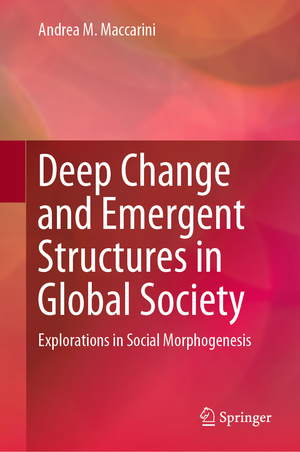Deep Change and Emergent Structures in Global Society: Explorations in Social Morphogenesis
Autor Andrea M. Maccarinien Limba Engleză Hardback – 13 mar 2019
The first part of the book presents the social ontology of the morphogenetic approach, and discusses its capacity to interpret macrosocial transitions. The second part then draws a prospective outline of the social formation known as the ‘morphogenic society,’ showing how unbound morphogenesis in a globalized world shapes such crucial phenomena as social norms, war and violence, openness and closure as adaptive responses from social organizations. Lastly, the third part examines the anthropological consequences of these societal trends, focusing on self and character as well as on human fulfillment and the ‘good life’.
Preț: 535.34 lei
Preț vechi: 629.81 lei
-15% Nou
Puncte Express: 803
Preț estimativ în valută:
102.45€ • 111.25$ • 86.06£
102.45€ • 111.25$ • 86.06£
Carte disponibilă
Livrare economică 02-16 aprilie
Preluare comenzi: 021 569.72.76
Specificații
ISBN-13: 9783030136239
ISBN-10: 303013623X
Pagini: 215
Ilustrații: XIII, 287 p. 15 illus.
Dimensiuni: 155 x 235 mm
Greutate: 0.64 kg
Ediția:1st ed. 2019
Editura: Springer International Publishing
Colecția Springer
Locul publicării:Cham, Switzerland
ISBN-10: 303013623X
Pagini: 215
Ilustrații: XIII, 287 p. 15 illus.
Dimensiuni: 155 x 235 mm
Greutate: 0.64 kg
Ediția:1st ed. 2019
Editura: Springer International Publishing
Colecția Springer
Locul publicării:Cham, Switzerland
Cuprins
Part 1: THE MORPHOGENETIC APPROACH: DEBATES AND EXTENSIONS.– Chapter 1. Introduction.- Chapter 2. Analysing the morphogenic society. Regularities and social ontology.- Chapter 3. After late modernity? The morphogenetic approach as hermeneutics of transition.- Part 2: AN OUTLINE OF THE MORPHOGENIC SOCIETY.- Chapter 4. Adaptive responses to unbound morphogenesis: openness and closure in turbulent times.- Chapter 5. War and violence in the morphogenic society.- Chapter 6. The logic of opportunity and its normative (dis)contents.- Chapter 7. Formations of the secular. Transcendence in a society without horizon.- Part 3: HUMANITY COUNTS. ANTHROPOLOGICAL CONSEQUENCES OF UNBOUND MORPHOGENESIS.- Chapter 8. The pressure on the human. Self and character in the new social order.- Chapter 9. A good life without horizon?.- Chapter 10. Conclusion. A glimpse on morphogenic futures.
Notă biografică
Andrea M. Maccarini holds a Ph.D. in Sociology and Social Policy (University of Bologna), and is currently a Full Professor of Sociology at the Department Associate Chair and Program Director for graduate studies in Social Work at the University of Padova, Department of Political Science, Law and International Studies.
At the University of Padova he is also head of the Social Sciences classes at the Galilean School of Higher Studies. He is on the teaching board of the Ph.D. in Sociology and Social Research at the University of Bologna, and has been a Visiting Scholar at various universities, including the University of California Los Angeles (UCLA), Boston University, and the Humboldt-Universität Berlin. He is a board member of IACR (International Association for Critical Realism) and collaborator of the Center for Social Ontology. He is also a bureau member and Associate Chair of OECD-Ceri (Center for Educational Reform and Innovation), and a member of the editorial board for various journals of sociology and the related social sciences.
His current research interests lie in the following fields:
a) social theory: He has been a co-author in the Social Morphogenesis series recently published by Springer, and writes extensively in this domain;
b) education: he has published extensively both in the field of education policy and on socialization processes and identity building. He is currently coordinating the Italian part of an OECD-led investigation on character skills among adolescents in various countries. He is collaborating in field research on the generation of ‘millennials’ and their personal and social identity;
c) cultural change: he is currently writing on the connection between war, violence and human rights in the XXI century. He is also working on a book about post-human cultural trends, reflexivity and socialization processes.
Textul de pe ultima copertă
This book addresses the problem of the transition to new forms of social order in the global world. As a haunting sense of historical discontinuity pervades Western societies, it offers a fresh perspective on the issue, focusing on two basic coordinates to pinpoint the developmental path of rapidly changing societies: one is the mechanism of unfettered social morphogenesis and the other is the specific kind of societal unification brought about by globalization, with the related closure of the world. The book draws on the theoretical work produced in the five volumes of the Springer series ‘’Social Morphogenesis’’ and applies it in a sustained and concerted approach to the empirical examination of macro-social change.
The first part of the book presents the social ontology of the morphogenetic approach, and discusses its capacity to interpret macrosocial transitions. The second part then draws a prospective outline of the social formation known as the ‘morphogenic society,’ showing how unbound morphogenesis in a globalized world shapes such crucial phenomena as social norms, war and violence, openness and closure as adaptive responses from social organizations. Lastly, the third part examines the anthropological consequences of these societal trends, focusing on self and character as well as on human fulfillment and the ‘good life’.
The first part of the book presents the social ontology of the morphogenetic approach, and discusses its capacity to interpret macrosocial transitions. The second part then draws a prospective outline of the social formation known as the ‘morphogenic society,’ showing how unbound morphogenesis in a globalized world shapes such crucial phenomena as social norms, war and violence, openness and closure as adaptive responses from social organizations. Lastly, the third part examines the anthropological consequences of these societal trends, focusing on self and character as well as on human fulfillment and the ‘good life’.
Caracteristici
Employs a morphogenetic approach to interpret macro-social trends, taking a fresh look at phenomena like war, human enhancement, and social norms Highlights the anthropological consequences of a new, ‘morphogenic,’ form of social order, contributing to character, skills, and human happiness studies Conducts a dialogue with diverse outstanding theorists and authors, like Abbott, Collins, Joas, Luhmann, and Rosa
